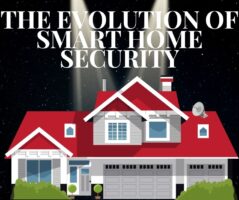The Evolution of Smart Home security

In an age where technology pervades every area of our lives, it’s no surprise that home security has evolved dramatically. Traditional locks and alarms are no longer used; instead, smart home security systems provide homeowners with previously inconceivable levels of protection and peace of mind. Let’s trip through the evolution of smart home security and see how it’s changing the way we protect our most valuable assets. The Rise of Smart Home Security The concept of smart home security arose from the intersection of two powerful forces: the Internet of Things (IoT) and advances in artificial intelligence (AI). By connecting sensors, cameras, and other smart gadgets to the internet, homeowners can now watch and control their houses remotely from anywhere in the globe. Key Features of Smart Home Security Systems Smart cameras The most important component of any smart home security system, is providing real-time video surveillance of your property. These cameras provide full monitoring against intruders by including capabilities like motion detection, night vision, and two-way voice communication. Smart doorbells are a modern take on the traditional doorbell, fitted with cameras, motion sensors, and intercom systems. They not only let you monitor and communicate with visitors remotely, but they also record important footage in the event of a break-in or parcel theft. Smart Doorbells Smart doorbells are a modern take on the traditional doorbell, fitted with cameras, motion sensors, and internet systems. In addition to providing you with remote monitoring and communication capabilities, they also capture crucial video footage that can be utilized in the event of a break-in or package theft. Smart Sensors which range from door/window sensors to motion detectors, serve an important role in detecting unwanted entry and generating alarms. When connected to a central hub or security system, these sensors can alert homes to potential dangers and initiate automated actions for safety. Smart Lock Say goodbye to fumbling for keys; smart locks allow you to lock and open your doors with your smartphone or your voice command. Smart locks provide increased security and make you more convenient through features such as virtual keys, access logs, and remote locking capabilities. Manufacturers and users were more conscious of the importance of safe and private smart home solutions.Robots are being developed for a variety of applications in the smart home, including cleaning, security, and entertainment. These robots can navigate and interact with their surroundings. A list of technologies that I believed were required in every home :Audio Video switches, and outletsComputer, internet, and phoneHeating & cooling SecuritySmoke detection, irrigation, and more. The Future Of Smart Home Security As technology advances, the future of smart home security appears brighter than ever. We should expect greater AI improvements, more seamless integration with other smart home devices, and improved interoperability across brands and ecosystems. Furthermore, the increasing frequency of smart cities and interconnected infrastructure will open up new chances for collaboration and innovation in the field of home security. Advantages of Smart Homes Smart homes provide several benefits to homeowners, including increased convenience, safety, efficiency, and overall quality of life. Here are several major advantages: Convenience: One of the main advantages of smart homes is the convenience they provide. With smart gadgets connected to a central system, homeowners may remotely manage numerous parts of their home environment via smartphone applications or voice commands. Smart homes simplify routine activities such as setting the thermostat, turning off lights, locking doors, and even starting appliances. Energy Efficiency: Smart home technology allows homeowners to optimize energy use and save on utility expenses. Smart thermostats, for example, may learn your heating and cooling preferences and automatically alter the temperature to save energy while you’re gone or sleeping. Similarly, smart lighting systems may be set to switch off lights in empty rooms or vary brightness levels in response to natural light, resulting in considerable long-term energy savings. Smart home security systems provide homeowners with more peace of mind by providing improved surveillance and monitoring capabilities. Smart cameras, doorbell cameras, and motion sensors enable you to keep an eye on your home in real time and receive immediate notifications in the event of unusual behavior. Furthermore, smart door locks allow for remote locking and unlocking, and features such as access logs give useful information about who enters and exits your property. Smart home technology may improve safety in a variety of ways, in addition to providing security. Smoke and carbon monoxide detectors can be linked to the smart home network to provide early warning of possible risks. In the case of an emergency, smart home technologies can immediately warn authorities and homeowners, reducing risks and ensuring a quick response. Customization and Personalization: Smart home technology allows homeowners to customize their living environments to fit their tastes and lifestyle. Whether it’s creating unique lighting settings, automating routines, or changing the atmosphere with smart speakers, the ability to tailor your home environment improves comfort and enjoyment. Remote Monitoring and Management: Smart home technology allows you to monitor and manage your house from anywhere, whether you’re at work, on vacation, or just gone. Remote access provides homeowners with additional control and flexibility over their living areas, whether they are at home or away. Integration and interoperability: Smart home gadgets are intended to operate together effortlessly, resulting in a unified ecosystem that improves functionality and interoperability. Homeowners may operate various smart devices with a single voice command or app thanks to integrations with platforms like Amazon Alexa, Google Assistant, and Apple HomeKit, simplifying the user experience and increasing convenience. The emergence of smart home security marks a fundamental shift in how we defend our houses. With smart devices, AI-powered analytics, and remote monitoring capabilities, homeowners may have more peace of mind knowing that their loved ones and assets are safe and secure. So, whether you’re a tech enthusiast wanting to embrace the latest technologies or just want to improve the safety of your house, the world of smart home security provides many options. After all, there’s no place like home, and
Best free online AI tools

Artificial Intelligence (AI) is a disruptive force in the ever-changing technology landscape that is transforming businesses and spurring innovation. AI used to be the domain of large, well-funded companies, but as it has become more accessible, anyone may now use sophisticated tools, regardless of skill level or funding. We’ll go into the fascinating realm of free AI tools in this blog post and see how they’re transforming the way we work, create, and resolve issues. Democratization of Innovation The days of AI being limited to specialized researchers and engineers are long gone. These days, a wide range of free AI tools enable individuals, entrepreneurs, and businesses of all kinds to take advantage of AI’s promise in a variety of industries. Whether Exploring Free AI Tools Across Domains 1. Natural Language Processing (NLP): 2. Computer Vision: 3. Machine Learning: 4. Speech Recognition: 5. Chatbots and Conversational AI: 6. Data Analytics and Visualization:
